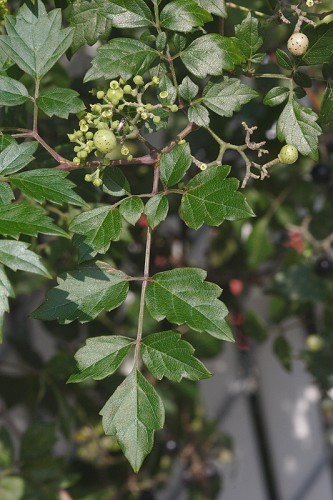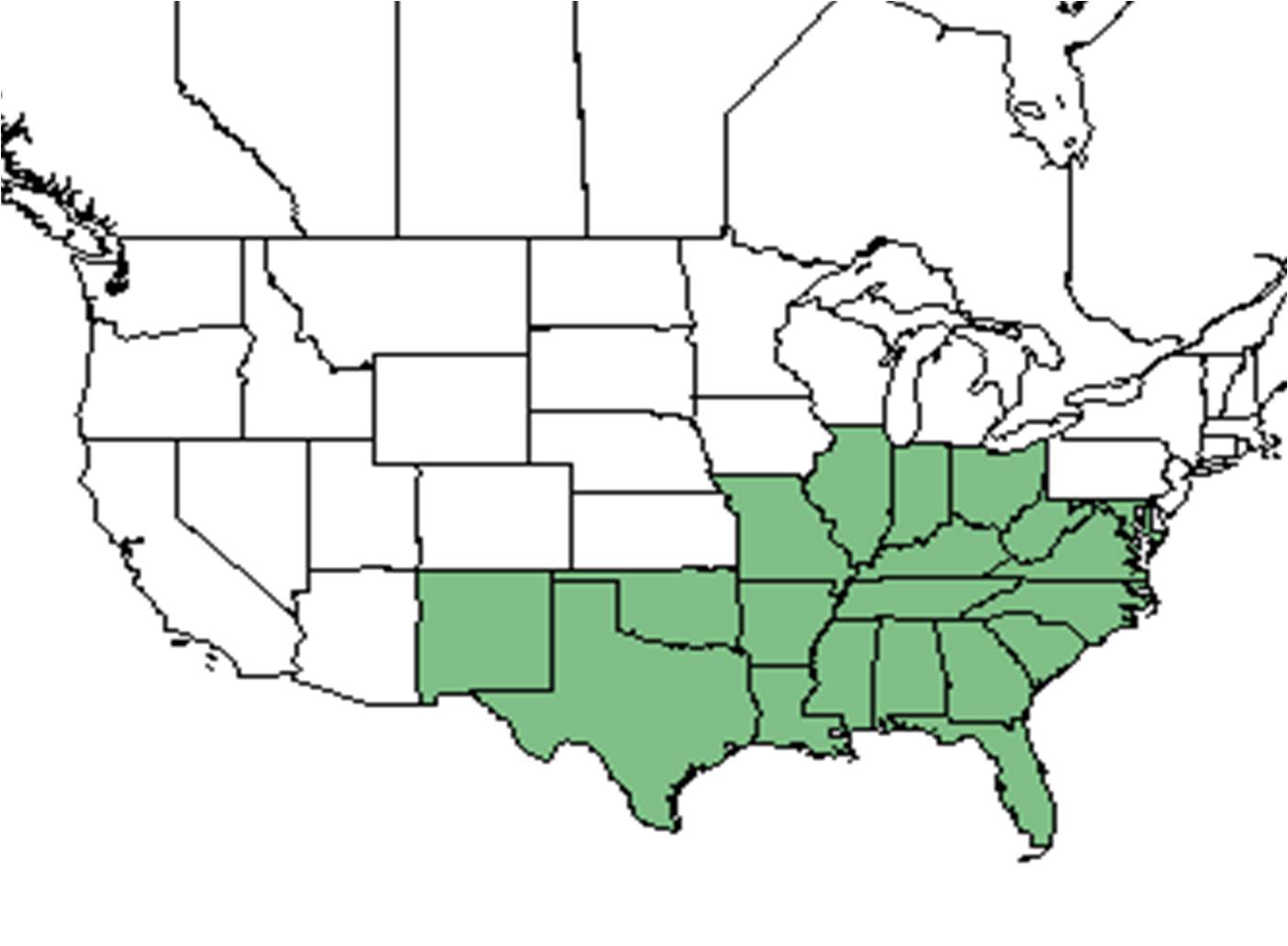Difference between revisions of "Ampelopsis arborea"
Lsandstrum (talk | contribs) |
|||
| Line 26: | Line 26: | ||
===Habitat=== <!--Natural communities, human disturbed habitats, topography, hydrology, soils, light, fire regime requirements for removal of competition, etc.--> | ===Habitat=== <!--Natural communities, human disturbed habitats, topography, hydrology, soils, light, fire regime requirements for removal of competition, etc.--> | ||
In the Coastal Plain in Florida, ''A. arborea'' can be found in river floodplains, wax myrtle thickets, hedgerows, coastal scrub savannas, and calcareous banks of drainage ditches.<ref name="FSU">Florida State University Robert K. Godfrey Herbarium database. URL: [http://herbarium.bio.fsu.edu http://herbarium.bio.fsu.edu]. Last accessed: October 2015. Collectors: R.K. Godfrey, R.F. Doren, R. Komarek, Loran Anderson. States and Counties: Florida: Gadsden, Leon, Wakulla, Franklin. Compiled by Tall Timbers Research Station and Land Conservancy.</ref> Associated species include ''Vitis rotundifolia, Juniperus virginiana, Ilex vomitoria, Ilex cassine, Bumelia lanuginosa'', and wax myrtle.<ref name=FSU></ref> | In the Coastal Plain in Florida, ''A. arborea'' can be found in river floodplains, wax myrtle thickets, hedgerows, coastal scrub savannas, and calcareous banks of drainage ditches.<ref name="FSU">Florida State University Robert K. Godfrey Herbarium database. URL: [http://herbarium.bio.fsu.edu http://herbarium.bio.fsu.edu]. Last accessed: October 2015. Collectors: R.K. Godfrey, R.F. Doren, R. Komarek, Loran Anderson. States and Counties: Florida: Gadsden, Leon, Wakulla, Franklin. Compiled by Tall Timbers Research Station and Land Conservancy.</ref> Associated species include ''Vitis rotundifolia, Juniperus virginiana, Ilex vomitoria, Ilex cassine, Bumelia lanuginosa'', and wax myrtle.<ref name=FSU></ref> | ||
| + | ''A. arborea'' responds positively to soil disturbance by agriculture in South Carolina communities indicating it exists in a post-agricultural woodland. <ref>Brudvig, L.A. and E.I. Damchen. (2011). Land-use history, historical connectivity, and land management interact to determine longleaf pine woodland understory richness and composition. Ecography 34: 257-266.</ref> | ||
| + | |||
===Phenology===<!--Timing off flowering, fruiting, seed dispersal, and environmental triggers. Cite PanFlora website if appropriate: http://www.gilnelson.com/PanFlora/ --> | ===Phenology===<!--Timing off flowering, fruiting, seed dispersal, and environmental triggers. Cite PanFlora website if appropriate: http://www.gilnelson.com/PanFlora/ --> | ||
''Ampelopsis arborea'' has been observed to flower between June and July.<ref>Nelson, G. [http://www.gilnelson.com/ PanFlora]: Plant data for the eastern United States with emphasis on the Southeastern Coastal Plains, Florida, and the Florida Panhandle. www.gilnelson.com/PanFlora/ Accessed: 7 DEC 2016</ref> | ''Ampelopsis arborea'' has been observed to flower between June and July.<ref>Nelson, G. [http://www.gilnelson.com/ PanFlora]: Plant data for the eastern United States with emphasis on the Southeastern Coastal Plains, Florida, and the Florida Panhandle. www.gilnelson.com/PanFlora/ Accessed: 7 DEC 2016</ref> | ||
Revision as of 19:55, 27 June 2019
| Ampelopsis arborea | |
|---|---|

| |
| John R. Gwaltney, Southeastern Flora.com | |
| Scientific classification | |
| Kingdom: | Plantae |
| Division: | Tracheophyta - Vascular plants |
| Class: | Magnoliopsida – Dicotyledons |
| Order: | Vitales |
| Family: | Vitaceae |
| Genus: | Ampelopsis |
| Species: | A. arborea |
| Binomial name | |
| Ampelopsis arborea (L.) Koehne | |

| |
| Natural range of Ampelopsis arborea from USDA NRCS Plants Database. | |
Common name: Peppervine
Contents
Taxonomic notes
Synonym: Ampelopsis arborea (Linnaeus) Koehne
Description
Distribution
Ecology
Habitat
In the Coastal Plain in Florida, A. arborea can be found in river floodplains, wax myrtle thickets, hedgerows, coastal scrub savannas, and calcareous banks of drainage ditches.[1] Associated species include Vitis rotundifolia, Juniperus virginiana, Ilex vomitoria, Ilex cassine, Bumelia lanuginosa, and wax myrtle.[1] A. arborea responds positively to soil disturbance by agriculture in South Carolina communities indicating it exists in a post-agricultural woodland. [2]
Phenology
Ampelopsis arborea has been observed to flower between June and July.[3]
Pollination
The following Hymenoptera families and species were observed visiting flowers of Ampelopsis arborea at Archbold Biological Station:[4]
Leucospididae: Leucospis robertsoni, L.slossonae
Pompilidae: Sericopompilus apicalis
Sphecidae: Cerceris flavofasciata floridensis, Isodontia auripes, I.exornata, Larra bicolor, Pseudoplisus smithii floridanus, Sphex ichneumoneus, Tanyoprymnus moneduloides
Conservation and management
Cultivation and restoration
Photo Gallery
References and notes
- ↑ 1.0 1.1 Florida State University Robert K. Godfrey Herbarium database. URL: http://herbarium.bio.fsu.edu. Last accessed: October 2015. Collectors: R.K. Godfrey, R.F. Doren, R. Komarek, Loran Anderson. States and Counties: Florida: Gadsden, Leon, Wakulla, Franklin. Compiled by Tall Timbers Research Station and Land Conservancy.
- ↑ Brudvig, L.A. and E.I. Damchen. (2011). Land-use history, historical connectivity, and land management interact to determine longleaf pine woodland understory richness and composition. Ecography 34: 257-266.
- ↑ Nelson, G. PanFlora: Plant data for the eastern United States with emphasis on the Southeastern Coastal Plains, Florida, and the Florida Panhandle. www.gilnelson.com/PanFlora/ Accessed: 7 DEC 2016
- ↑ Deyrup, M.A. 2015. Database of observations of Hymenoptera visitations to flowers of plants on Archbold Biological Station, Florida, USA.